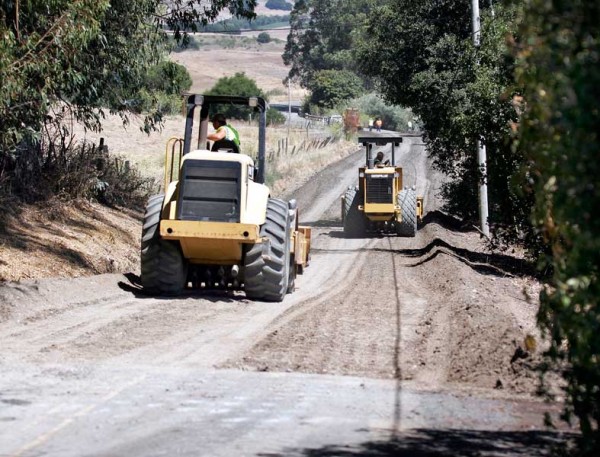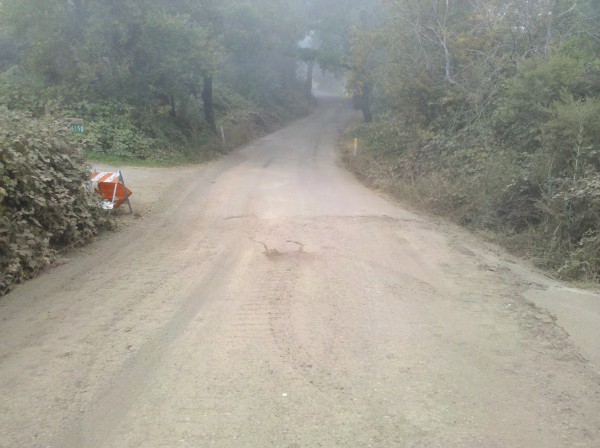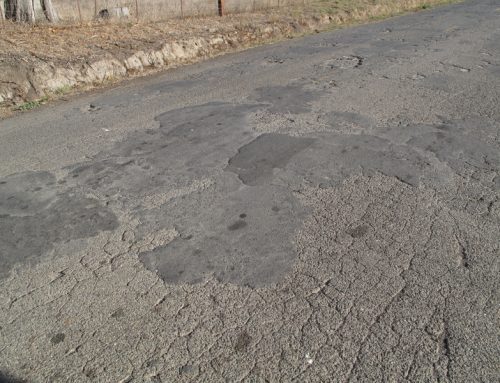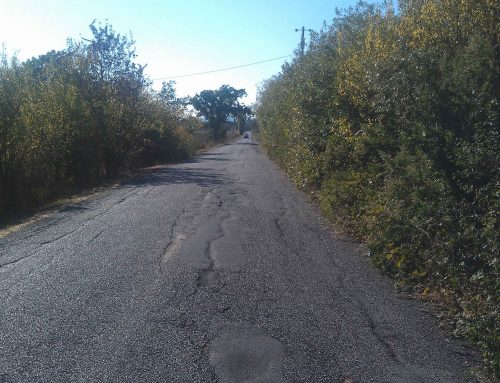
Sonoma County crews compact a stretch of Sonoma Mountain Road off of Adobe
Road near Petaluma as part of a maintenance test to see if the section, ground up
and injected with a hardening enzyme, can withstand winter storms.
Press Democrat photo by Jeff Kan Lee
Martin Stein came home from a two-week vacation to find Sonoma Mountain Road in front of his house had been turned into dirt, and he doesn’t like it.
A 600-foot stretch of the one-time asphalt road and about 10 inches of the dirt below had been pulverized, injected with water containing a hardening enzyme and compacted, leaving for now essentially a hard-surfaced yet dirt road. Next year, it’ll be chip sealed.
Stein’s section is part of an experiment by the Sonoma County Transportation and Public Works Department to see if it can stretch its maintenance dollars by smoothing out pothole-patched roads without having to completely rebuild them.
Sonoma Mountain Road, which likely was originally built as a dirt road, is the test site: The 600-foot stretch in the 6100 block between Santa Rosa and Kenwood as well as two other stretches –- 900 feet and 2,400 feet -– off Adobe Road near Petaluma. Grinding of the longer stretches, both marked with dozens and dozens of pothole patching, began Monday.
Rob Houweling, operations coordinator for the department’s northern-southern division, said the county wants to see how the stretches of road hold up during this winter’s storms before deciding whether the tests are a success.

Another test section of the specially treated dirt road is on a 600-foot section
of Sonoma Mountain Road between Bennett Valley and Kenwood.
This photo shows the dirt portion meeting the asphalt part of the road.
Photo by pressdemocrat.com.
He said the biodegradable enzyme product, Perma-Zyme11x, bonds the grounded up road into a hard surface that is supposed to shed water. If the tests prove successful, then Houweling said the stretches of road will be chip sealed next year and the county will consider grinding up other rural roads that get little use but need extensive repairs. CLICK HERE to see a Perma-Zyme11x video of how the process works.
If the tests fail, he said, the county will make repairs and chip seal the three sections of Sonoma Mountain Road.
Houweling emphasized that the pulverization-enzyme treatment provides the county with “huge cost savings.”
As an example, he noted the 900- and 2,400-foot sections will cost $8,000 in enzyme, plus $6,400 for renting a mammoth road pulverizer machine and an undetermined amount for county workers’ time. In contrast, it would cost the county $75,000 in asphalt alone to cover those sections 2 inches deep, he said.
Other counties have used the pulverization-enzyme technique with success.
Steve Stangland, road superintendent for Lake County’s Public Works Department, pretty much swears by the technique.
He said Permazyme bonds the ground up asphalt and clay soil into a concrete-like road surface.
“It saves us a lot of money” for road maintenance, he said.
He said he’s done several stretches of roads in Lake County using the technique, including four miles of Big Canyon Road near Middletown.
Despite the road departments’ enthusiasm for the technique, Stein isn’t.
“The amount of dust is substantial every time a car comes through,” he said.
“As an asthmatic, I am not delighted by the thought of breathing this dust in my house and whenever I drive or jog along the road,” he said.
The dust also coats the tasty blackberries growing along the road, he said. And a neighbor is planning to put in a vineyard and the dust will affect that as well, he said.
Houweling said dust from the road should dissipate over time and he promised to send a sweeper truck to remove some of the loose dirt.
Stein conceded his road needed some help — it was in the same lousy shape as the rest of the road is” –- and he’s “symphathetic to the money concerns.”
But he’s upset residents weren’t notified of the project, which Houweling acknowledged wasn’t done, and thinks the county should chip seal his road now rather than later.
He said he’s not opposed to his road being chip sealed rather than paved – “we have chip sealed roads on our ranch and they do fine” – but “why not chip seal it now to see if it” holds up?



